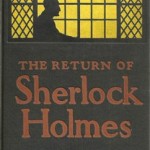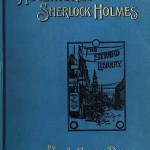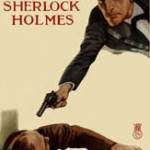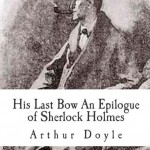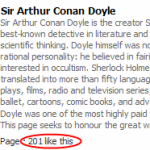It was in the year ’95 that a combination of events, into which I need not enter, caused Mr. Sherlock Holmes and myself to spend some weeks in one of our great university towns, and it was during this time that the small but instructive adventure which I am about to relate befell us. It will be obvious that any details which would help the reader exactly to identify the college or the criminal would be injudicious and offensive. So painful a scandal may well be allowed to die out. With due discretion the incident itself may, however, be described, since it serves to illustrate some of those qualities for which my friend was remarkable. I will endeavour, in my statement, to avoid such terms as would serve to limit the events to any particular place, or give a clue as to the people concerned.
We were residing at the time in furnished lodgings close to a library where Sherlock Holmes was pursuing some laborious researches in early English charters—researches which led to results so striking that they may be the subject of one of my future narratives. Here it was that one evening we received a visit from an acquaintance, Mr. Hilton Soames, tutor and lecturer at the College of St. Luke’s. Mr. Soames was a tall, spare man, of a nervous and excitable temperament. I had always known him to be restless in his manner, but on this particular occasion he was in such a state of uncontrollable agitation that it was clear something very unusual had occurred.
“I trust, Mr. Holmes, that you can spare me a few hours of your valuable time. We have had a very painful incident at St. Luke’s, and really, but for the happy chance of your being in town, I should have been at a loss what to do.”
“I am very busy just now, and I desire no distractions,” my friend answered. “I should much prefer that you called in the aid of the police.”
“No, no, my dear sir; such a course is utterly impossible. When once the law is evoked it cannot be stayed again, and this is just one of those cases where, for the credit of the college, it is most essential to avoid scandal. Your discretion is as well known as your powers, and you are the one man in the world who can help me. I beg you, Mr. Holmes, to do what you can.”
My friend’s temper had not improved since he had been deprived of the congenial surroundings of Baker Street. Without his scrapbooks, his chemicals, and his homely untidiness, he was an uncomfortable man. He shrugged his shoulders in ungracious acquiescence, while our visitor in hurried words and with much excitable gesticulation poured forth his story.
“I must explain to you, Mr. Holmes, that to-morrow is the first day of the examination for the Fortescue Scholarship. I am one of the examiners. My subject is Greek, and the first of the papers consists of a large passage of Greek translation which the candidate has not seen. This passage is printed on the examination paper, and it would naturally be an immense advantage if the candidate could prepare it in advance. For this reason, great care is taken to keep the paper secret.
“To-day, about three o’clock, the proofs of this paper arrived from the printers. The exercise consists of half a chapter of Thucydides. I had to read it over carefully, as the text must be absolutely correct. At four-thirty my task was not yet completed. I had, however, promised to take tea in a friend’s rooms, so I left the proof upon my desk. I was absent rather more than an hour.
“You are aware, Mr. Holmes, that our college doors are double—a green baize one within and a heavy oak one without. As I approached my outer door, I was amazed to see a key in it. For an instant I imagined that I had left my own there, but on feeling in my pocket I found that it was all right. The only duplicate which existed, so far as I knew, was that which belonged to my servant, Bannister—a man who has looked after my room for ten years, and whose honesty is absolutely above suspicion. I found that the key was indeed his, that he had entered my room to know if I wanted tea, and that he had very carelessly left the key in the door when he came out. His visit to my room must have been within a very few minutes of my leaving it. His forgetfulness about the key would have mattered little upon any other occasion, but on this one day it has produced the most deplorable consequences.
“The moment I looked at my table, I was aware that someone had rummaged among my papers. The proof was in three long slips. I had left them all together. Now, I found that one of them was lying on the floor, one was on the side table near the window, and the third was where I had left it.”
Holmes stirred for the first time.
“The first page on the floor, the second in the window, the third where you left it,” said he.
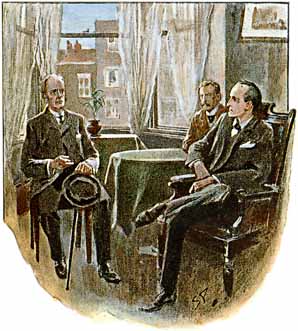
“Exactly, Mr. Holmes. You amaze me. How could you possibly know that?”
“Pray continue your very interesting statement.”
“For an instant I imagined that Bannister had taken the unpardonable liberty of examining my papers. He denied it, however, with the utmost earnestness, and I am convinced that he was speaking the truth. The alternative was that someone passing had observed the key in the door, had known that I was out, and had entered to look at the papers. A large sum of money is at stake, for the scholarship is a very valuable one, and an unscrupulous man might very well run a risk in order to gain an advantage over his fellows.
“Bannister was very much upset by the incident. He had nearly fainted when we found that the papers had undoubtedly been tampered with. I gave him a little brandy and left him collapsed in a chair, while I made a most careful examination of the room. I soon saw that the intruder had left other traces of his presence besides the rumpled papers. On the table in the window were several shreds from a pencil which had been sharpened. A broken tip of lead was lying there also. Evidently the rascal had copied the paper in a great hurry, had broken his pencil, and had been compelled to put a fresh point to it.”
“Excellent!” said Holmes, who was recovering his good-humour as his attention became more engrossed by the case. “Fortune has been your friend.”
“This was not all. I have a new writing-table with a fine surface of red leather. I am prepared to swear, and so is Bannister, that it was smooth and unstained. Now I found a clean cut in it about three inches long—not a mere scratch, but a positive cut. Not only this, but on the table I found a small ball of black dough or clay, with specks of something which looks like sawdust in it. I am convinced that these marks were left by the man who rifled the papers. There were no footmarks and no other evidence as to his identity. I was at my wit’s end, when suddenly the happy thought occurred to me that you were in the town, and I came straight round to put the matter into your hands. Do help me, Mr. Holmes. You see my dilemma. Either I must find the man or else the examination must be postponed until fresh papers are prepared, and since this cannot be done without explanation, there will ensue a hideous scandal, which will throw a cloud not only on the college, but on the university. Above all things, I desire to settle the matter quietly and discreetly.”
“I shall be happy to look into it and to give you such advice as I can,” said Holmes, rising and putting on his overcoat. “The case is not entirely devoid of interest. Had anyone visited you in your room after the papers came to you?”
“Yes, young Daulat Ras, an Indian student, who lives on the same stair, came in to ask me some particulars about the examination.”
“For which he was entered?”
“Yes.”
“And the papers were on your table?”
“To the best of my belief, they were rolled up.”
“But might be recognized as proofs?”
“Possibly.”
“No one else in your room?”
“No.”
“Did anyone know that these proofs would be there?”
“No one save the printer.”
“Did this man Bannister know?”
“No, certainly not. No one knew.”
“Where is Bannister now?”
“He was very ill, poor fellow. I left him collapsed in the chair. I was in such a hurry to come to you.”
“You left your door open?”
“I locked up the papers first.”
“Then it amounts to this, Mr. Soames: that, unless the Indian student recognized the roll as being proofs, the man who tampered with them came upon them accidentally without knowing that they were there.”
“So it seems to me.”
Holmes gave an enigmatic smile.
“Well,” said he, “let us go round. Not one of your cases, Watson—mental, not physical. All right; come if you want to. Now, Mr. Soames—at your disposal!”
The sitting-room of our client opened by a long, low, latticed window on to the ancient lichen-tinted court of the old college. A Gothic arched door led to a worn stone staircase. On the ground floor was the tutor’s room. Above were three students, one on each story. It was already twilight when we reached the scene of our problem. Holmes halted and looked earnestly at the window. Then he approached it, and, standing on tiptoe with his neck craned, he looked into the room.
“He must have entered through the door. There is no opening except the one pane,” said our learned guide.
“Dear me!” said Holmes, and he smiled in a singular way as he glanced at our companion. “Well, if there is nothing to be learned here, we had best go inside.”

